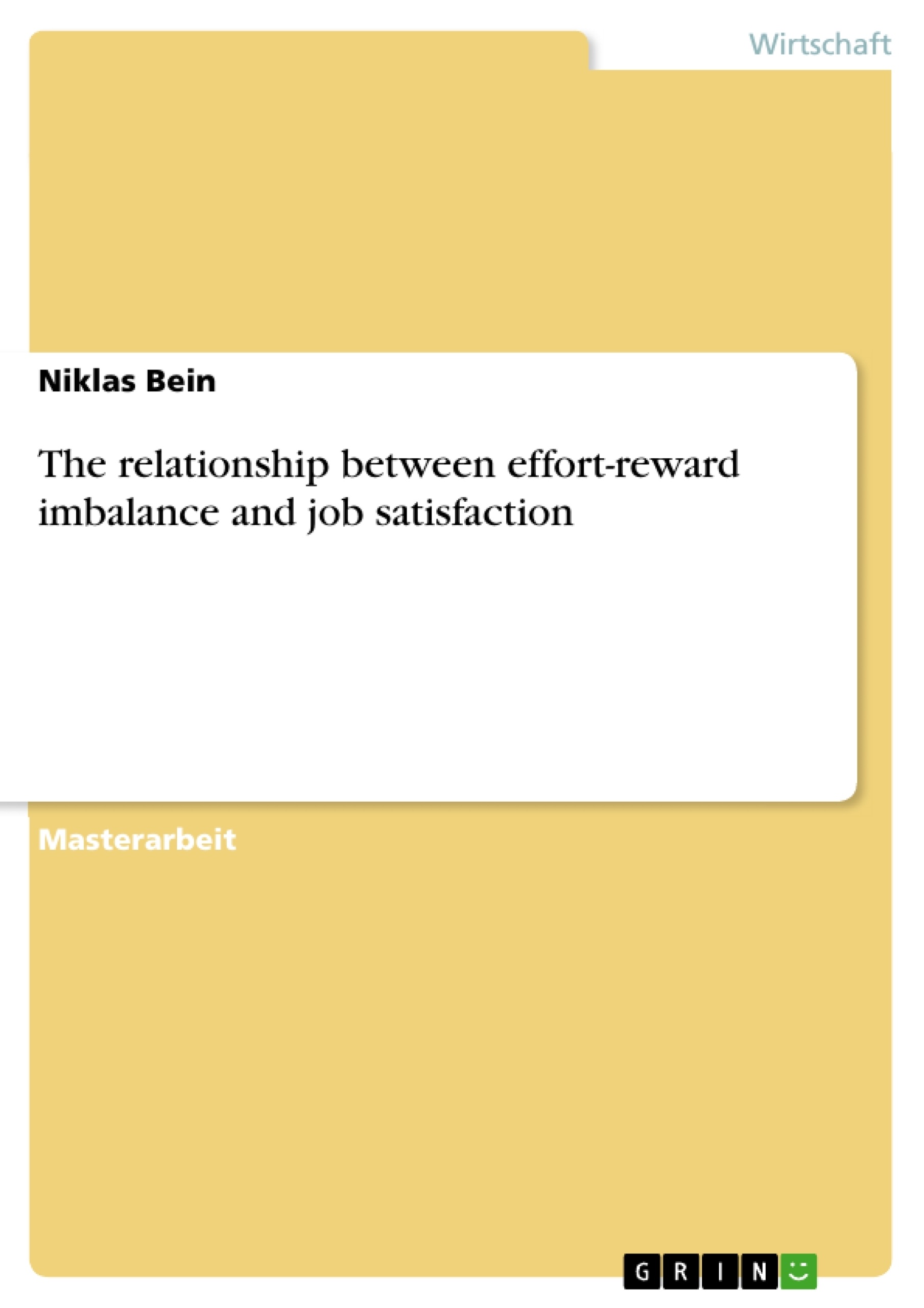The specific goal of this work is to provide empirical evidence on the relationship between effort-reward imbalance and job satisfaction. This work will determine whether the absolute value of the balance between efforts and rewards is of relevance.
The research question is addressed in the following structure. The author presents the theoretical foundations of job satisfaction and the effort reward imbalance model complemented with a literature review on existent empirical literature on the interplay of ERI and employees’ well-being. Afterwards the data set, the operationalisation of the variables and the statistical methods will be described. The following chapter presents descriptive statistical data and analyses the results of the applied regression models. Next the findings of this thesis on the background of existing literature will be discussed. Then the findings will be critically appraised and the author points out implications for practice and further research before the last chapter concludes.
The construct of job satisfaction has been in focus of many scholars during the last century. The topic has gained attention from many different disciplines, such as applied psychology, econometrics and the business field. Locke approached job satisfaction with affect theory stating that it results from congruence of the expectations to a job and the fulfilment of these expectations. The present work aims to incorporate different streams by applying the effort-reward imbalance (ERI) model. This model is based on the transactional stress model. It explains employees’ well-being as a result of a balance between invested effort and received rewards plus a psychological dimension called overcommitment (OVC).
Inhaltsverzeichnis
- 1 Introduction
- 2 Theoretical foundations
- 2.1 Job satisfaction
- 2.2 Effort-reward imbalance
- 2.3 Empirical findings.
- 2.3.1 ERI and employer health
- 2.3.2 ERI and job satisfaction
- 2.4 Formulation of hypotheses
- 3 Method
- 3.1 Data sample.
- 3.2 Operationalisation of variables
- 3.2.1 Dependent variable .
- 3.2.2 Independent variables
- 3.2.3 Control variables
- 3.3 Statistical procedures
- 4 Results
- 4.1 Descriptive results.
- 4.2 Linear regression
- 4.2.1 Extrinsic ERI and job satisfaction
- 4.2.2 Intrinsic overcommitment and job satisfaction.
- 4.2.3 Interaction of extrinsic ERI and overcommitment
- 5 Discussion
- 6 Critical appraisal
- 6.1 Implications for methodology and research
- 6.2 Practical implications
- 7 Conclusion
Zielsetzung und Themenschwerpunkte
Diese Masterarbeit untersucht den Zusammenhang zwischen dem Effort-Reward-Imbalance (ERI)-Modell und der Arbeitszufriedenheit. Die Arbeit konzentriert sich auf die empirische Evaluation des ERI-Modells mit Hilfe des Sozioökonomischen Panels (SOEP) in Deutschland.
- Zusammenhang zwischen ERI und Arbeitszufriedenheit
- Empirische Untersuchung des ERI-Modells anhand des SOEP
- Analyse der Auswirkungen von extrinsischer ERI und intrinsischer Überengagement auf die Arbeitszufriedenheit
- Untersuchung der Interaktion zwischen extrinsischer ERI und Überengagement
- Praktische Implikationen der Ergebnisse für die Personalwirtschaft
Zusammenfassung der Kapitel
- Kapitel 1: Introduction
Die Einleitung stellt das Forschungsproblem vor und erläutert die Relevanz der Untersuchung. Sie gibt einen Überblick über die Forschungslücke und die Forschungsfragen, die in der Arbeit behandelt werden.
- Kapitel 2: Theoretical foundations
Dieses Kapitel stellt die theoretischen Grundlagen der Arbeit dar. Es werden die Konzepte der Arbeitszufriedenheit und des Effort-Reward-Imbalance-Modells erläutert. Es werden auch empirische Ergebnisse aus früheren Studien zum ERI-Modell vorgestellt, die sich mit den Auswirkungen von ERI auf die Gesundheit von Arbeitnehmern und die Arbeitszufriedenheit befassen.
- Kapitel 3: Method
In diesem Kapitel werden die verwendeten Daten und Methoden erläutert. Es werden die Datenquelle, die Variablen und die statistischen Verfahren beschrieben, die für die Analyse der Daten verwendet werden.
- Kapitel 4: Results
Dieses Kapitel präsentiert die Ergebnisse der Datenanalyse. Es werden deskriptive Statistiken und Regressionen durchgeführt, um die Zusammenhänge zwischen ERI und Arbeitszufriedenheit zu untersuchen.
- Kapitel 5: Discussion
Das Diskussionskapitel interpretiert die Ergebnisse und diskutiert ihre Bedeutung. Es wird die Frage untersucht, ob die Ergebnisse die Hypothesen bestätigen oder widerlegen.
- Kapitel 6: Critical appraisal
Dieses Kapitel bewertet die methodischen und praktischen Implikationen der Studie. Es wird diskutiert, wie die Ergebnisse für die Forschung und die Praxis relevant sind.
Schlüsselwörter
Die Arbeit konzentriert sich auf die folgenden Schlüsselwörter: Effort-Reward-Imbalance (ERI), Arbeitszufriedenheit, Sozioökonomisches Panel (SOEP), Deutschland, Personalwirtschaft, Regression, empirische Forschung.
Häufig gestellte Fragen
Was ist das Effort-Reward-Imbalance (ERI) Modell?
Das Modell erklärt das Wohlbefinden am Arbeitsplatz als Ergebnis des Gleichgewichts zwischen investierter Anstrengung (Effort) und erhaltener Belohnung (Reward).
Wie hängen ERI und Arbeitszufriedenheit zusammen?
Eine Dysbalance, bei der hohe Anstrengung niedriger Belohnung gegenübersteht, führt empirisch belegt zu einer signifikant geringeren Arbeitszufriedenheit.
Was bedeutet "Overcommitment" (OVC)?
Overcommitment ist eine psychologische Dimension, die ein übermäßiges inneres Engagement oder die Unfähigkeit beschreibt, von der Arbeit abzuschalten.
Welche Daten wurden für diese Untersuchung genutzt?
Die Arbeit basiert auf einer empirischen Evaluation von Daten des Sozioökonomischen Panels (SOEP) in Deutschland.
Welche praktischen Implikationen ergeben sich für die Personalwirtschaft?
Unternehmen sollten Belohnungssysteme (Gehalt, Anerkennung, Aufstiegschancen) optimieren, um Stress zu reduzieren und die Mitarbeiterbindung zu erhöhen.
- Quote paper
- Niklas Bein (Author), 2016, The relationship between effort-reward imbalance and job satisfaction, Munich, GRIN Verlag, https://www.grin.com/document/506906



